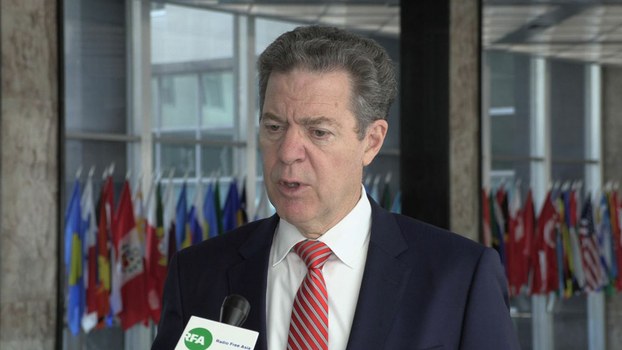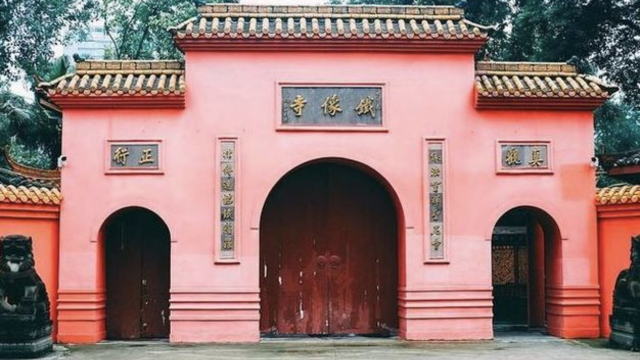
Brownback, a former U.S. senator and state governor, told RFA’s Uyghur Service in an interview that Washington is focused on highlighting the detention camps and other abuses of the roughly 11 million Turkic-speaking Muslims in the XUAR.
“This is a horrific human rights situation that’s happening—over a million in detention camps, while those that aren’t in the detention camps are in a virtual type of detention camp, with all of the security cameras and artificial intelligence systems,” he said.
“And we’re highlighting to the world that this is what China is doing to their Muslim minority population.”
In 2019, Brownback and other Trump administration officials have hosted high-level religious freedom conferences at the State Department and at the United Nations, and both events placed a sharp focus on Chinese repression of the Uyghurs, which has been longstanding but intensified in early 2017.
Up to 1.5 million Uyghurs and other Muslim ethnic minorities accused of harboring “strong religious views” and “politically incorrect” ideas have been held since April 2017. Reporting by RFA’s Uyghur Service and other media outlets has shown that those in the camps routinely face rough treatment at the hands of their overseers, and endure poor diets and unhygienic conditions.
“We’re just pointing out to the world that this is what China is doing, and China’s response has been really just to bluster, to say that this is some sort of anti-terrorism effort to lock a million people up,” Brownback said.
“But their responses have been, I don’t think, good or accurate, or really doing justice to the situation,” he added.
Though Beijing initially denied the existence of re-education camps, China has tried to change the discussion, describing the facilities as “boarding schools” that provide vocational training for Uyghurs, discourage radicalization and help protect the country from terrorism.
Brownback’s office as well as U.S. diplomats have repeatedly called on Muslim-majority countries and the 57-nation Organization of Islamic Cooperation (OIC) to confront China over the Uyghur crisis—to little avail.
“I’m disappointed in their silence,” he said when asked by RFA about the Muslim world’s response to the Uyghurs’ plight.
“It’s my hope that a number of people on the streets in these Muslim majority countries will start to hear about what’s taking place with the Uyghurs and that … their voices will raise up and force their leadership to speak out more aggressively and more effectively against what China is doing,” said Brownback.
‘People need to get their courage back’
China’s immense economic clout has been cited by several Asian neighbors as the main reason few Muslim-majority countries are willing to challenge China.
Prime Minister Mahathir Mohamad told the RFA-affiliated BenarNews, during an interview in New York last month on the sidelines of the annual UN General Assembly, that China’s diplomatic and economic power may have prevented Muslim nations from criticizing its repression of the ethnic Uyghur minority.
“Because China is a very powerful nation,” the 94-year-old leader told BenarNews. “You don’t just try and do something which would anyway fail, so it is better to find some other less violent ways not to antagonize China too much, because China is beneficial for us.”
Brownback said, however, that “history will not reward their silence.”
“I think people need to get their courage back—that a lot of people are just scared of the Chinese money. That somehow China is going to punish them economically, or withhold some sort of trade agreement with them,” Brownback said.
The campaign by Brownback and the State Department to halt the incarcerations has also been joined by the U.S. Congress, which is debating legislation that seeks accountability for China’s harsh crackdown on the Uyghurs. The Uyghur Human Rights Policy Act would appoint a special State Department coordinator on Xinjiang and require regular reports on the camps, the surveillance network and the security threats posed by the crackdown.
A related effort by U.S. lawmakers calls for the imposition sanctions under the Global Magnitsky Act, crafted initially to deal with rights abuses in Russia, on XUAR Party Secretary Chen Quanguo and other Chinese officials leading the repression of ethnic Uyghurs and other Muslim minorities in the region.
Reported by Alim Seytoff for RFA’s Uyghur Service. Written by Paul Eckert.
Source: Copyright © 1998-2016, RFA. Used with the permission of Radio Free Asia, 2025 M St. NW, Suite 300, Washington DC 20036. https://www.rfa.org.












